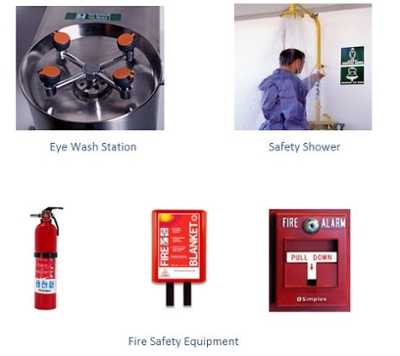Lab attire and Personal Protective Equipment (PPE)
- Approved eye protection, with side shields, must be worn AT ALL TIMES.
- Long sleeved, and legged clothing, and shoes with solid uppers must be worn in the laboratory.
- Long hair and/or loose clothing must be confined. Avoid wearing dangling jewelry.
- Wear clothing that offers the most protection - a lab coat or apron is required when working in the laboratory.
- Wear appropriate gloves and face protection when working with hazardous liquids, solids, or solutions.
Proper Dress and PPE Video Illustration
Lab safety equipment
- Locate and identify the lab safety equipment when you enter the lab for first time.
- Use the eyewash immediately in the event of an eye injury or chemical splash. Rinse copiously for 10-15 minutes and have the eyes checked by a physician afterwards.
- Use a safety shower in the event of a chemical spill. Pull the overhead handle and remove clothing that may be contaminated with chemicals, to allow the skin to be rinsed.
- Use fire extinguishers, fire blankets and fire alarms in case of any fire accidents or fire emergencies. Use fire Extinguishers only if you are properly trained.
Safety Equipment Video Illustration
Lab safety behavior
- Never work alone in the laboratory.
- Never conduct unauthorized experiments or engage in horseplay in a laboratory. Please immediately report any unsafe behavior to the instructor.
- Eating, drinking, chewing gum, and applying cosmetics are prohibited in the laboratories. No smoking!
- Do not store food or beverages in the same refrigerators or freezers with chemicals, biohazards, or radioactive materials.
- Never pipet anything by mouth.
- Never pick up broken glass/chemicals with bare hands
- The work area must be kept clean and uncluttered. All chemicals should be labeled and stored properly.
- Follow Standard Operating Procedures (SOP’s)
- The hazards of chemicals used should be known (e.g., corrosiveness, flammability, reactivity, stability, and toxicity).Safety Data Sheets (SDSs) should be available for all non-routine or acutely toxic chemicals used and stored in the laboratory.
- Always pay attention to your surroundings and be aware of what others are doing. Always be courteous.
- Remove contaminated gloves before touching common use devices (door knobs, faucets, equipment); discard gloves before leaving the laboratory.
- Wash glassware, return reagents/chemicals, clean work bench, dispose wastes, remove PPE and wash hands with soap and water before leaving the lab

Evacuation procedure
In case of major chemical spills and fire emergencies, call emergency for assistance
- Use the shortest & safest passage to the exit.
- Exit the building in a calm & orderly manner.
- DO NOT RUN
- Alert people and pull the fire alarm on your way out if it has not already been pulled.
- DO NOT use the elevator.
- Do not re-enter the building until the university safety personnel has authorized to entry
Emergency contact information:
- Emergency services - 911 (Beaumont Police)
- Emergency services - 9* 911 (from any campus phone)
Emergency telephone numbers:
- 7777 ( from any campus phone)
- LU Health center - 880.8466
- LU Safety specialist - 409.880.8008
More information can be found below:
Emergency Contact Information
Continue to Next Section : GHS Labeling & SDS



